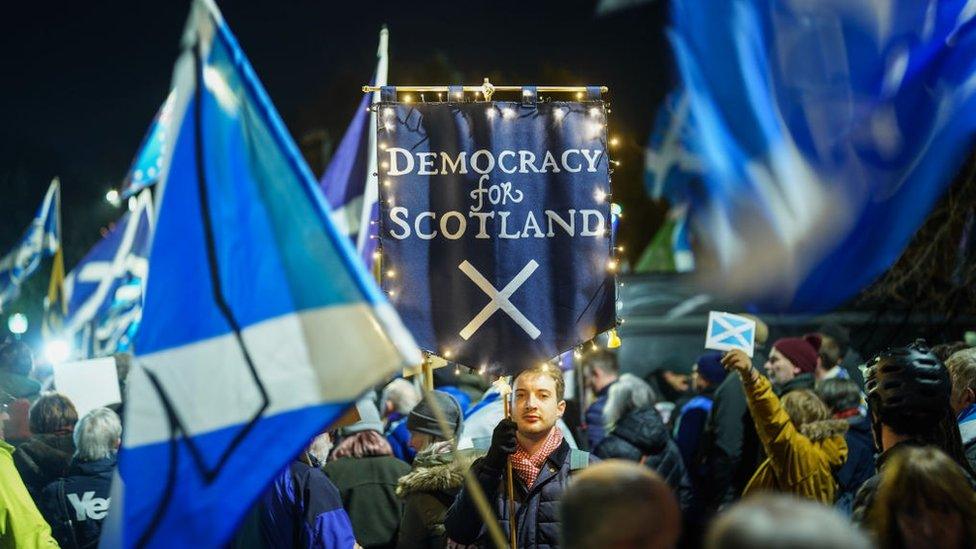SNP MP Stewart McDonald criticises Nicola Sturgeon's independence strategy
- Published
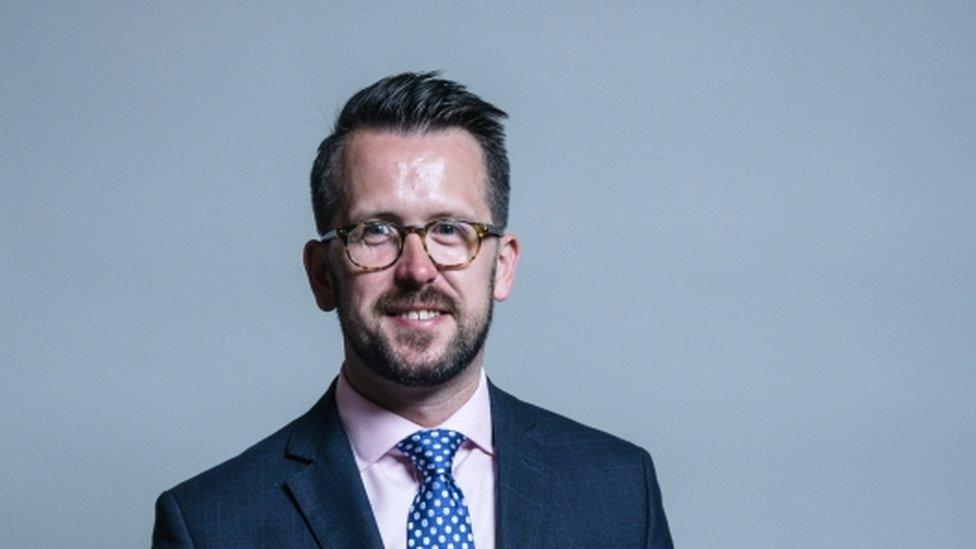
Stewart McDonald was formerly the SNP's defence spokesman at Westminster
An SNP MP has criticised Nicola Sturgeon's plan to use the next general election as a de facto referendum on independence.
Stewart McDonald believes the move will not actually deliver independence.
He instead urged the party to look to build sustained majority support for independence in order to force Westminster to agree to a referendum.
The SNP is to hold a special conference on 19 March to decide its strategy.
Members will be given two options, with the first being Ms Sturgeon's plan of attempting to win a majority of the votes in Scotland at the next general election, which is likely to be next year, and then seeking to open negotiations over independence with the UK government.
But there is no guarantee that the UK government would agree to this, and there is nothing in law that would force it to do so.
Alternatively, the SNP could decide to use the next Scottish Parliament election in 2026 in the same way.
There have been reports that some SNP politicians are uneasy about the proposals, which would see the SNP campaign on the single issue of independence.
Mr McDonald - who is generally seen as being an ally of the first minister - has published a paper arguing that both options risked significantly damaging the independence movement.
It describes a de facto referendum as a "deficient mechanism for the party to opt for" which has "the potential for all sorts of problems for the cause" and "will not deliver independence".
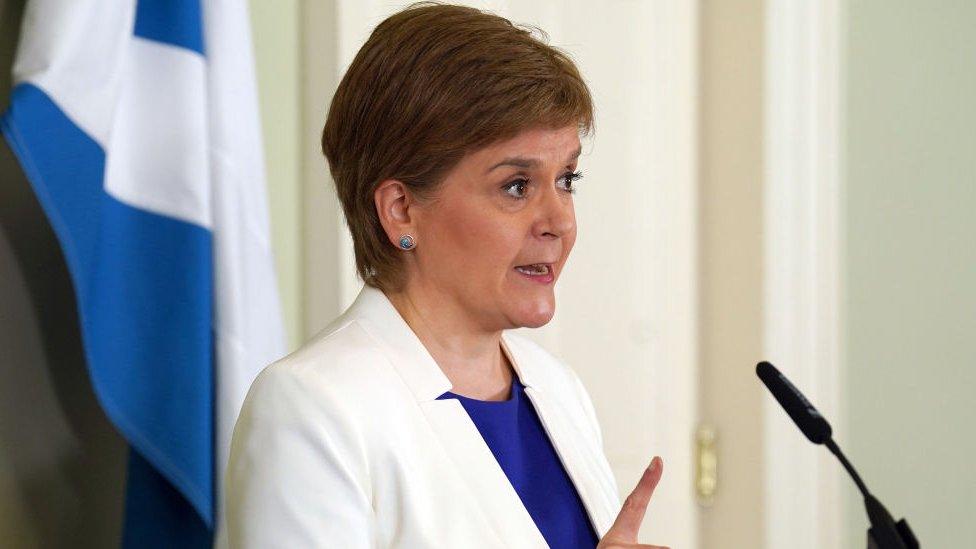
Ms Sturgeon was forced to come up with an alternative strategy after the Supreme Court ruled she does not have the power to hold a referendum
Speaking to the BBC's Good Morning Scotland programme he said polling suggested that most people in Scotland were opposed to the de facto referendum plan.
He warned that independence would not be delivered if only one side in the debate was treating the election as a referendum, and acknowledged the "difficulties" of securing more than 50% of the votes.
The Glasgow South MP argued that the SNP should "stick to calls for a legitimate referendum", saying that this was "what the public would expect" and also "what the international community would expect".
Mr McDonald urged his party to create a "properly funded national campaign" aimed at driving up support for independence to levels that would force the UK government to agree to another "legitimate" referendum.
He said: "I think part of the reason why we are stuck at the moment and that there is this miasma of impatience - impatience that I share entirely - is because support for independence isn't yet clearly the sustained majority opinion in Scotland.
"I think that is the problem that we need to fix with some urgency before we go into the next election."
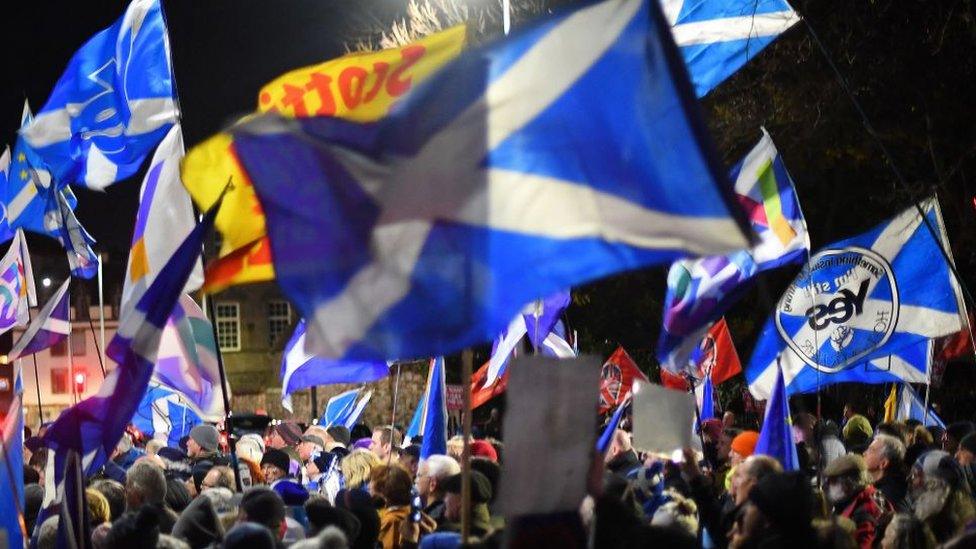
Opinion polls have suggested the Scotland is essentially split down the middle on the question of independence
Mr McDonald said SNP branches were already starting to decide what kind of amendments and alternative positions they might put forward during the special conference.
He added: "We can do that in the best traditions of the SNP, which is a robust exchange in a fraternal way, and get the movement onto a path that materially moves us closer to independence by taking the public with us.
"We are not quite there yet, but I believe we can do it."
Mr McDonald also insisted that Ms Sturgeon would not have to "back away" from her preferred strategy as she had "correctly kicked this out to the party to have a debate and come to a decision" on the best way forward.


Nicola Sturgeon doesn't just have opposition leaders to contend with. This week she has also been taking flak from SNP members on gender reform, as well as from her old mentor-turned-foe Alex Salmond.
With a party conference looming where the first minister has invited an open debate about the route towards independence, even her allies can complicate matters.
Stewart McDonald has long been seen as a pragmatic, centrist voice within the SNP's Westminster operation and the furthest thing from a rebel or thorn in the side of the leadership.
But he is part of an apparently growing chorus of voices willing to kick around ideas which run contrary to Ms Sturgeon's preferred positions.
To be clear, the first minister remains very much in charge of a party which remains miles ahead of its competitors in Scotland.
But the rows and fractures she is currently contending with would probably have been unimaginable a year ago.

Mr McDonald was speaking after revealing that his emails have been stolen and he fears they will be made public.
The hack took place in January, with the group responsible believed to be linked to Russia's spy services.
The same group is said to have published hacked emails and documents by other individuals, including the former head of MI6 Sir Richard Dearlove and journalist Paul Mason.
The first minister's plan to use the next general election as a de facto referendum was a response to the Supreme Court ruling that she did not have the power to hold a vote on independence this year.
She later said the option of using the next Holyrood election as a de facto referendum instead of the next general election would also be put to SNP members in the interests of having a "full and open debate" on the way forward.
Ms Sturgeon added: "Given the significance of this decision for both the party and the country, it is important that this debate is a full, free and open one - which is what the draft resolution seeks to enable.
"While this will be a debate on the process of securing independence, it is one that will be guided by a fundamental principle - that the future of Scotland must and will be decided by the people of Scotland, not by Westminster politicians."
The first minister had previously described talk of attempting to bring about independence via an election as a "unionist trap".
The last time any party in Scotland got more than 50% of the votes in a general election was the Conservatives in 1955.
The SNP fell just short of it while winning a huge landslide in 2015, and won 45% of the votes at the last general election in 2019.
Scottish Conservative constitution spokesman Donald Cameron said Ms Sturgeon's de facto referendum strategy was "the height of arrogance and totally irresponsible".
He added: "It is not up to Nicola Sturgeon and the SNP to tell the public the issues on which a general election will be fought. Voters can decide that for themselves.
"The sooner that Nicola Sturgeon recognises that and listens to not only the wider public, but those in her own party who are clearly opposed to her plans, the better."
- Published8 February 2023
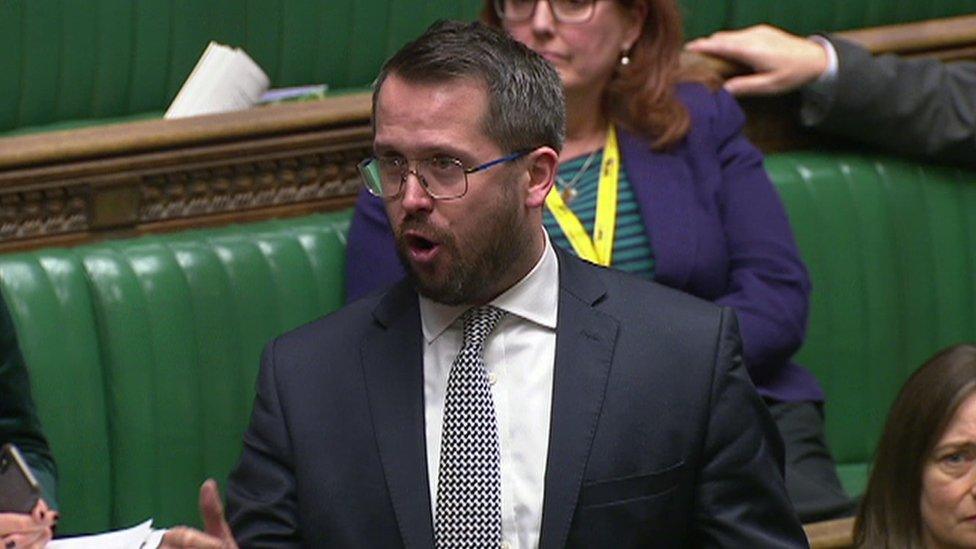
- Published24 November 2022
